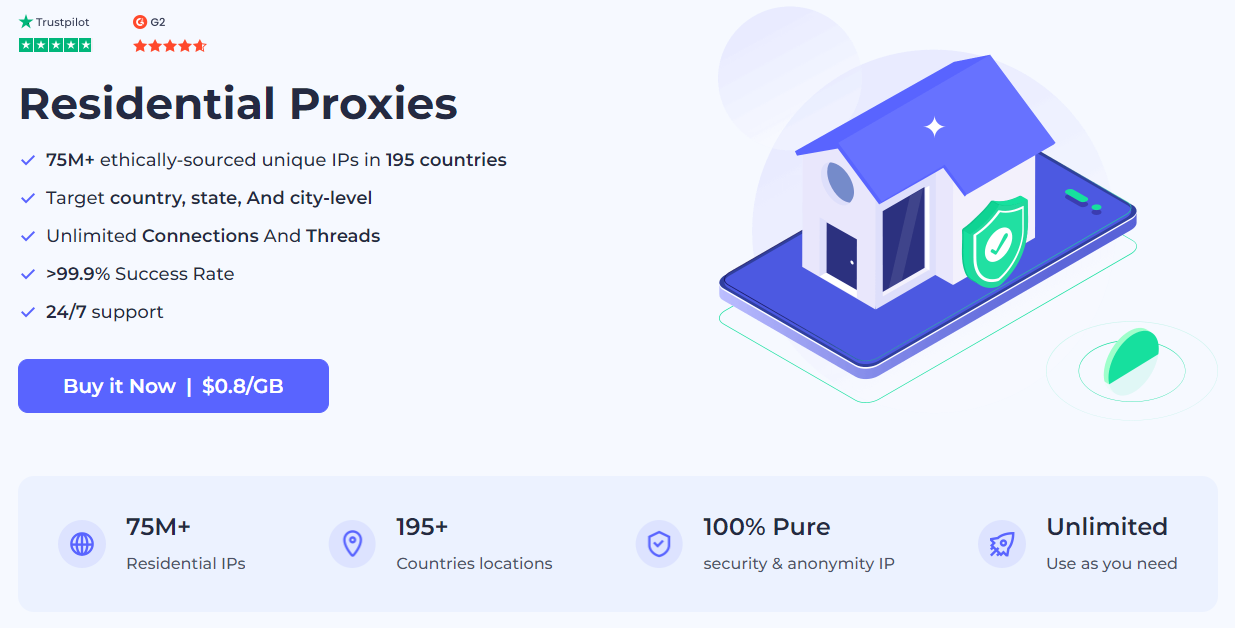
As the digital advertising industry grows fast, ad verification becomes more important than ever. In this competitive and changing market, ensuring that ads reach their target audience accurately and effectively is crucial. It affects not only the authenticity of ad results but also the reputation of ad platforms and the quality of user experience. Traditional ad verification methods struggle with geographic limitations and the challenge of large, hard-to-collect data. In this context, residential proxies are emerging as a new ad verification tool. They are quickly gaining attention and providing new solutions and ideas for the industry.
The Importance and Challenges of Ad Verification
First of all, the goal of ad verification is to ensure ads are shown according to the advertiser’s plan, in the right locations, at the right times, and to the right audiences. This helps make ad targeting more precise and improves the efficiency and effectiveness of ads. Secondly, by verifying if the target audience actually sees the ads, ad verification can help increase conversion rates and improve the return on ad investment. More importantly, ad verification helps identify and prevent fraud, such as fake clicks and impressions, and ensure advertisers pay for genuine user interactions. It also prevents ads from appearing on websites with negative content or in environments that do not match the brand, so as to protect brand image. Finally, by collecting and analyzing ad data, ad verification helps understand ad performance, identify why some ads do not work well, provide data to support future ad strategies and creativity, and optimize future campaigns.
However, ad verification faces many challenges, especially with dynamic IP addresses, click frauds, and data processing. Many users have dynamically assigned IP addresses, which can change over time. This makes long-term tracking and verifying user activity harder. Data center proxies and mobile proxies are widespread and appear in large proxy pools, which make it more complex to distinguish between real users and proxy users. Additionally, malicious actors may use automated tools to simulate clicks or generate fake traffic to gain unfair profits. This not only affects the advertiser’s campaign results but also damages the reputation of ad platforms. Some ads may disguise themselves as real content or misleading ads, to trick users into clicking or taking actions for improper benefits. Furthermore, handling large amounts of data and the complexity of user behavior also pose higher demands for ad verification.
What Are the Advantages of Residential Proxies? How Do They Help with Ad Verification?
Residential proxies have significant advantages over free proxies and data center proxies. Since residential proxies are real IP addresses assigned to regular users, they possess high authenticity and anonymity. This effectively protects the data security of businesses and individuals. Additionally, with residential proxies, users can easily access blocked or restricted content, while also improving network speed and stability.
Then, how do residential proxies enhance ad verification? First, advertisers usually need to customize their ad content based on users’ geographic locations for precise targeting. Residential IP proxies, with their high anonymity and global coverage, can provide residential IPs from various regions. This allows ad verification systems to safely access public web pages worldwide and check if ads are correctly displayed in target areas, so as to optimize ad strategies and improving conversion rates. Moreover, residential proxies can simulate real user behavior, including visit frequency, browsing patterns, and click actions. For example, these proxies can randomize visit intervals and page depth to mimic real browsing behavior. They also help identify and prevent click fraud and traffic manipulation. By detecting and analyzing user behavior patterns simulated by residential proxy IPs, advertisers can quickly identify anomalies and take appropriate measures to protect the effectiveness of ad campaigns and their interests. Furthermore, protecting user data security is crucial during ad verification. Using residential proxies can effectively hide real IP addresses, so as to prevent personal information from being misused. Proxy servers can also encrypt transmitted data to further enhance data security.
How to Choose High-Quality Residential Proxies?
After understanding the key role of residential proxies in ad verification, how do we choose high-quality residential proxies from many providers? We should consider the following factors:
IP Pool Size and Quality: A large IP pool offers more IP choices, and reduces the risk of detection and blocking. The IP addresses should be real residential IPs, not data center IPs. High-quality residential IPs are more secure and anonymous, and harder to detect and block.
Geographic Coverage: Ensure the provider has broad geographic coverage to meet the ad verification needs of different regions. If your ads target specific areas, make sure the provider has enough IP addresses in those areas.
Anonymity and Security: High-quality proxies should be highly pure and offer anonymous connections to prevent detection by target websites.
Supported Protocols and Features: The provider should support common protocols like HTTP, HTTPS, and SOCKS5 to meet various needs.
Technical Support: Reliable providers have strong technical teams and offer 24/7 support and customer service to handle emergencies and technical issues.
Based on my understanding, ProxyShare, one of the leading residential proxy providers in the market, excels in these areas. It has over 75 million unique IPs from ethical sources, covering 195 countries worldwide. These IPs are all real residential IP addresses with 100% purity, which can effectively protect users’ personal information and data security. ProxyShare also offers unlimited residential proxies with no bandwidth or session limits, supporting large-scale data collection and web scraping activities.

What Are the Specific Use Cases?
So far, ProxyShare’s residential proxies have helped many businesses with effective ad verification and precise targeting, and greatly increased the conversion rates and market competitiveness. Here are some specific cases:
Case 1: A cross-border e-commerce company advertised on Facebook and Instagram. They used ProxyShare’s residential proxies to simulate different regions and user groups to verify if the ads were correctly shown on the target users’ timelines. For example, they ensured the ads were effectively displayed to user groups of different ages, genders, and interests.
Case 2: An online education company advertised on Google Ads. They used ProxyShare’s residential proxies to simulate users in different regions and on different devices searching for specific keywords. This verified if the ads were correctly shown on the search results page. For instance, they ensured the ads were effectively displayed in search results in various countries.
Case 3: A travel company launched a series of ads featuring photos and videos of specific destinations. Using ProxyShare’s residential proxies, the company simulated visits from users in different regions to ensure the ad content was correctly displayed without loading errors due to regional restrictions or network issues.
Notes
When using residential proxies for ad verification, keep the following points in mind:
Multi-Platform Testing: Test ads on different platforms like Facebook, Google Ads, and Instagram. Also, simulate different devices such as phones, tablets, and desktops, as well as different browsers like Chrome, Firefox, and Safari. This ensures ads display correctly in all environments.
Multiple Verifications and Monitoring: Continuously monitor ad campaigns and regularly verify ad display to spot and fix issues promptly. Conduct multiple verifications at different times during the ad campaign to gather comprehensive data on ad performance.
Follow Ad Platform Policies: Make sure to abide by each ad platform’s policies and guidelines during ad verification. This helps avoid account bans or ad removals due to policy violations.
Conclusion
To conclude, ad verification plays an important role in preventing click fraud, maintaining brand image, optimizing ad strategies, and increasing conversion rates and market competitiveness. The new trend in ad verification shows that the innovative use of residential proxies is becoming a powerful tool. With high-quality residential proxies, advertisers can better simulate user behavior and ensure ad display and user experience worldwide. Advanced technology and smart management make the ad verification process more efficient and secure. In the ever-changing ad market, the innovative use of residential proxies undoubtedly provides strong support for advertisers, taking ad businesses to new heights.


